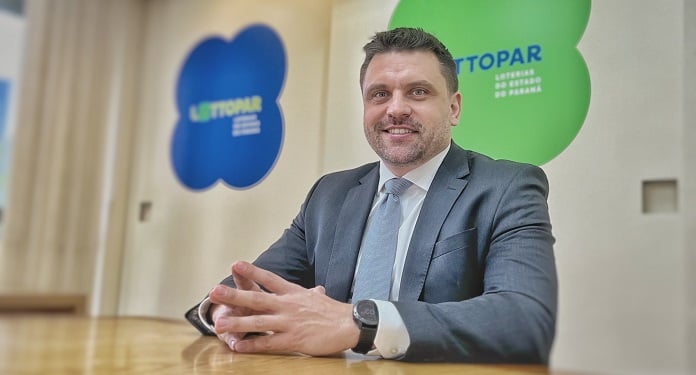State lotteries have been gaining repercussions in recent years in Brazil. Lottopar (Loterias do Paraná) is one of the most active on the scene, proposing and opening new business possibilities.
Thus, the entity’s CEO, Daniel Romanowski, is the author of the text: “The state Lottery can be the driving force for municipalities, in order to encourage the generation of employment and income with social return”, reproduced in full below. Check out!
Text written by Daniel Romanowski
“As a manager at the head of Loterias do Paraná (Lottopar), an agency linked to the State Secretariat for Administration and Pensions of the Government of Paraná, I am convinced that state lotteries will be more beneficial for municipalities and the Union, boosting the economy and the generation of employment with social return.
But always with actions based on current legislation, as a way of providing legal security for licensed operators operating in Paraná. These dealers authorized to operate in our State are obliged to follow the determination of Federal Laws, State Laws and State Decrees inherent to the subject.
According to the laws in force and recalling an important decision by the Federal Supreme Court, published in December 2020, states and the Federal District have the right to explore lottery activities in their territories. This means that the Union does not have exclusivity to establish lotteries and explore their modalities. However, it is important to highlight that this STF decision does not extend to municipalities. In other words, even with this decision, municipalities are not authorized to create their own lotteries.
As previously stated, municipalities do not have the power to legislate on the subject and in my opinion there is no market size for municipal lotteries. The prize ranges are also not attractive enough to attract players to municipal lotteries. We also have another important aspect to consider, which is the fact that municipalities, when creating their municipal lotteries, will waive the Tax on Services of Any Nature (ISSQN) and other more voluptuous social contributions to obtain much lower taxation.
It is also necessary to consider that the amounts collected by the State Lottery are destined for the municipalities through actions and investments by the Government of Paraná in public security, popular housing and social actions, that is, with the state lottery, the municipalities benefit from the collection of taxes, social contributions and social return.
Another aspect of the advantage of the state lottery compared to municipal lotteries is capillarity, since the lottery games authorized, monitored and supervised by Lottopar reach all regions of the State and, as stated in the Notice, the concessionaire is obliged to implement its physical points of sale dedicated stores in the ten mesoregions of the State, as well as non-dedicated retail outlets, such as newspaper and magazine stands, convenience stores, among other locations authorized by Lottopar.
As a way of legally supporting our position against some municipal movements for the creation of their own lotteries, I leave an excerpt from a statement by one of Brazil’s greatest lawyers for the lottery market, Dr. Roberto Brasil Fernandes, author of the book Direito das Loterias, where he highlights that “within the normative framework presented, the only alternative for municipalities is to seek collaboration with the state in which they are located, or with the Union, to have part of the revenue transferred in their territory, in addition to the collection of the Tax About Services of Any Nature (ISSQN) about the Lottery business.
It is concluded, therefore, that in addition to the grounds for the STF’s decision not honoring the issue, it is noted that the constitution itself does not honor the competence of municipalities to operate lotteries, as it does not attribute residual competence to them, as is the case with Member States and Federal District”.
In an interview with the Lottopar communications team, at the Cibelae Congress in Argentina in April this year, Dr. Roberto Brasil Fernandes also reinforces that “what the municipalities are doing is a legal adventure, not even foreseen in the Constitution and very except in the STF decision.
I was one of the lawyers who joined the Supreme Court with ADPF 493 and the court’s understanding is very clear and only states are given the right to sell lottery modalities. There is nothing in any provision of the Supreme Court that meets the municipalities’ desire to create their own municipal lotteries, which is clearly a legal adventure for the mayors.”
We understand, therefore, that from a legal point of view, according to Decree-Law No. 6,259, of February 10, 1944, in its art. 4th, “Only the Union and the States will be able to explore or grant lottery services, with more than one lottery exploration or concession being prohibited”, municipalities, when venturing into a matter that is not their responsibility, can create a legal battle .
On the other hand, the state lottery is not a competitor to municipalities, on the contrary, it is a safe and responsible source of entertainment, with social returns and which socially benefits citizens. The resources raised by Lottopar will be invested in municipalities through actions by the Government of Paraná, for example, in improving public safety, construction of popular housing and social actions. The municipality itself benefits.
Today, Lottopar is able to offer a lottery market with legal security for concessionaires who are investing in our State, security for bettors, in addition to placing the State of Paraná at the forefront in Brazil in many pioneering and innovative actions, which leaves the Lottopar among the best state lotteries in Brazil.
Our search is constant for a safe, responsible lottery market with the highest levels of compliance and governance, which is why we are the only lottery in Brazil to be associated with the three largest sports betting lottery associations in the world.
We were the first state lottery in Brazil associated with the World Lottery Association (WLA), the largest lottery association in the world; the first lottery associated with the Union of Lotteries for Integrity in Sports (ULIS), which promotes educational actions against the manipulation of sports results, in addition to being associated with Cibelae, which is an Ibero-American state-owned lottery and betting corporation, the largest in Latin America.
Claims of Non-compliance with Fundamental Precepts (ADPFs) 492 and 493 were judged by the Federal Supreme Court (STF) and resulted in the recognition of the competence of the states and the Federal District to explore lottery activities in their territories. This means that, as established in the STF decision, the institution of lotteries or the exploration of lottery modalities is not exclusive to the Union.
However, it is crucial to highlight that this STF decision does not extend to municipalities. In other words, although states and the Federal District have the approval to operate lotteries within their jurisdictions, municipalities do not have this same authorization.
The reason for this distinction is related to the division of competencies established by the Brazilian Federal Constitution. While states and the Federal District have the autonomy to legislate on certain issues, including lottery activities, municipalities are subject to a different range of powers, with less authority over certain areas, such as lotteries.
Therefore, although the STF decision has a significant impact by recognizing the competence of the states and the Federal District in this context, it does not grant municipalities the ability to create and operate their own lotteries. This is an important distinction to consider when interpreting the scope of this decision.”




















































